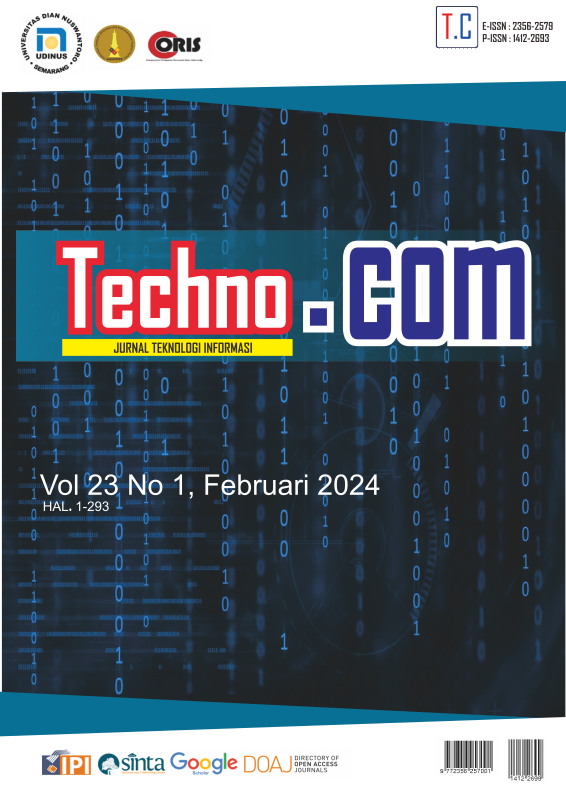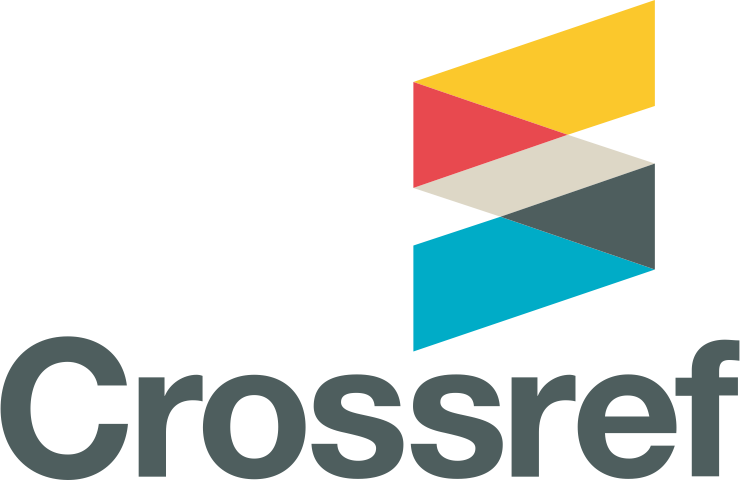Klasifikasi Tingkat Kemampuan Adaptasi Siswa dalam Pembelajaran Online Menggunakan Decision Tree
DOI:
https://doi.org/10.62411/tc.v23i1.9739Keywords:
Pembelajaran Mesin, Decision Tree, Feature Engineering, Kemampuan Beradaptasi SiswaAbstract
Kemajuan dalam ilmu pengetahuan dan teknologi mendorong adaptasi terhadap pemanfaatan teknologi di berbagai sektor, seperti komunikasi, pendidikan, dan informasi. Terutama dalam konteks teknologi pendidikan, dapat diamati bahwa pembelajaran online sedang mendapatkan popularitas yang signifikan di berbagai lembaga pendidikan. Oleh karena itu, penting untuk mengeksplorasi seberapa baik peserta didik dapat beradaptasi dengan lingkungan pembelajaran online. Memprediksi tingkat adaptasi peserta didik memiliki signifikansi yang besar bagi pendidik dan pengembang platform pembelajaran online, dengan tujuan meningkatkan efisiensi dan kualitas pengalaman belajar. Penelitian ini menggunakan dataset “Students Adaptability Level in Online Education” dengan menerapkan pendekatan Algoritma Decision Tree. Hasil penelitian memperoleh akurasi sebesar 95%, meningkat 7,44% dari penelitian sebelumnya yang hanya memperoleh akurasi sebesar 87,56% dengan menggunakan algoritma yang sama tanpa Feature Engineering. Hal ini menunjukkan bahwa Feature Engineering memegang peranan penting dalam klasifikasi tingkat kemampuan adapatasi siswa untuk mendapatkan hasil yang baik dengan akurasi yang tinggi.References
C. HARK, H. OKUMU?, and T. UÇKAN, “Adaptation to Online Education: An Educational Data Mining Application,” Computer Science, Nov. 2022, doi: 10.53070/bbd.1199055.
N. Hark Söylemez, “An Investigation on Students’ Level of Adjustment to Online Education with C5.0 Decision Tree Algorithm,” Shanlax International Journal of Education, vol. 11, no. 2, pp. 64–73, Mar. 2023, doi: 10.34293/education.v11i2.5783.
B. B. Lockee, “Online education in the post-COVID era,” Nature Electronics, vol. 4, no. 1. Nature Research, pp. 5–6, Jan. 01, 2021. doi: 10.1038/s41928-020-00534-0.
M. M. H. Suzan, N. A. Samrin, A. A. Biswas, and M. A. Pramanik, “Students’ Adaptability Level Prediction in Online Education using Machine Learning Approaches,” in 2021 12th International Conference on Computing Communication and Networking Technologies, ICCCNT 2021, Institute of Electrical and Electronics Engineers Inc., 2021. doi: 10.1109/ICCCNT51525.2021.9579741.
B. Sekeroglu, K. Dimililer, and K. Tuncal, “Student performance prediction and classification using machine learning algorithms,” in ACM International Conference Proceeding Series, Association for Computing Machinery, 2019, pp. 7–11. doi: 10.1145/3318396.3318419.
G. H. Wang, J. Zhang, and G. S. Fu, “Predicting student behaviors and performance in online learning using decision tree,” in Proceedings - 2018 7th International Conference of Educational Innovation through Technology, EITT 2018, Institute of Electrical and Electronics Engineers Inc., Jul. 2018, pp. 214–219. doi: 10.1109/EITT.2018.00050.
A. Malik et al., “Forecasting students’ adaptability in online entrepreneurship education using modified ensemble machine learning model,” Array, vol. 19, Sep. 2023, doi: 10.1016/j.array.2023.100303.
I. Pan, A. Mukherjee, and V. Piuri, “Advances in Intelligent Systems and Computing 1355 Proceedings of Research and Applications in Artificial Intelligence.” [Online]. Available: http://www.springer.com/series/11156
?. Aydo?du, “Predicting student final performance using artificial neural networks in online learning environments,” Educ Inf Technol (Dordr), vol. 25, no. 3, pp. 1913–1927, May 2020, doi: 10.1007/s10639-019-10053-x.
V. Matzavela and E. Alepis, “Decision tree learning through a Predictive Model for Student Academic Performance in Intelligent M-Learning environments,” Computers and Education: Artificial Intelligence, vol. 2, Jan. 2021, doi: 10.1016/j.caeai.2021.100035.
A. B. Raut and A. A. Nichat, “Students Performance Prediction Using Decision Tree Technique,” 2017. [Online]. Available: http://www.ripublication.com
G. Koulinas, P. Paraschos, and D. Koulouriotis, “A machine learning-based framework for data mining and optimization of a production system,” in Procedia Manufacturing, Elsevier B.V., 2021, pp. 431–438. doi: 10.1016/j.promfg.2021.10.059.
D. Kumar, “Biographical notes: Priyanka received her Bachelor of Technology in Computer Science and Engineering (CSE) and Master of Technology in CSE from GJUS&T,” 2020.
B. Rajoub, “Characterization of biomedical signals: Feature engineering and extraction,” in Biomedical Signal Processing and Artificial Intelligence in Healthcare, Elsevier, 2020, pp. 29–50. doi: 10.1016/B978-0-12-818946-7.00002-0.
W. Long, Z. Lu, and L. Cui, “Deep learning-based feature engineering for stock price movement prediction,” Knowl Based Syst, vol. 164, pp. 163–173, Jan. 2019, doi: 10.1016/j.knosys.2018.10.034.
P. W. Khan and Y. C. Byun, “Genetic algorithm based optimized feature engineering and hybrid machine learning for effective energy consumption prediction,” IEEE Access, vol. 8, pp. 196274–196286, 2020, doi: 10.1109/ACCESS.2020.3034101.
C. Fan, Y. Sun, Y. Zhao, M. Song, and J. Wang, “Deep learning-based feature engineering methods for improved building energy prediction,” Appl Energy, vol. 240, pp. 35–45, Apr. 2019, doi: 10.1016/j.apenergy.2019.02.052.
Z. K. D. Alkayyali, B. S. Abu-Nasser, A. M. Taha, Q. M. M. Zarandah, and S. S. Abu-Naser, “Prediction of Student Adaptability Level in e-Learning using Machine and Deep Learning Techniques,” 2022. [Online]. Available: www.ijeais.org/ijaar
C. Sri, K. Aditya, V. Rahmayanti, S. Nastiti, Y. Aminuddin, and M. A. Rofiq, “Prediction of Student Adaptability Level in Online Education Using Support Vector Machine with GridSearchCV Optimization.”
M. M. H. Suzan, N. A. Samrin, A. A. Biswas, and M. A. Pramanik, “Students’ Adaptability Level Prediction in Online Education using Machine Learning Approaches,” in 2021 12th International Conference on Computing Communication and Networking Technologies, ICCCNT 2021, Institute of Electrical and Electronics Engineers Inc., 2021. doi: 10.1109/ICCCNT51525.2021.9579741.
Downloads
Published
Issue
Section
License
License Terms
All articles published in Techno.COM Journal are licensed under the Creative Commons Attribution-NonCommercial 4.0 International (CC BY-NC 4.0). This means:
1. Attribution
Readers and users are free to:
-
Share – Copy and redistribute the material in any medium or format.
-
Adapt – Remix, transform, and build upon the material.
As long as proper credit is given to the original work by citing the author(s) and the journal.
2. Non-Commercial Use
-
The material cannot be used for commercial purposes.
-
Commercial use includes selling the content, using it in commercial advertising, or integrating it into products/services for profit.
3. Rights of Authors
-
Authors retain copyright and grant Techno.COM Journal the right to publish the article.
-
Authors can distribute their work (e.g., in institutional repositories or personal websites) with proper acknowledgment of the journal.
4. No Additional Restrictions
-
The journal cannot apply legal terms or technological measures that restrict others from using the material in ways allowed by the license.
5. Disclaimer
-
The journal is not responsible for how the published content is used by third parties.
-
The opinions expressed in the articles are solely those of the authors.
For more details, visit the Creative Commons License Page:
? https://creativecommons.org/licenses/by-nc/4.0/
















